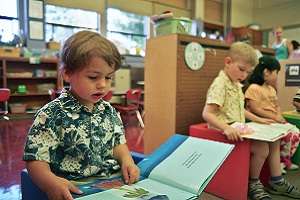Varied child language skills linked to early learning achievements

Young children present a mixed bag when it comes to determining which factors impact their vocabulary development, according to a recent investigation.
The study, by The Telethon Institute for Child Health Research, found substantial variation in receptive vocabulary ability (words we understand) at four, six and eight years of age as well as in the rate of growth between 4–8 years old.
UWA Professor and lead author Catherine Taylor says the study of 4332 children across Australia provided an opportunity to examine influences on variation in receptive vocabulary ability and that such studies are rare.
Using growth curve modelling, the study estimated trajectories of vocabulary development in children between 4–8 years, in relation to a wide range of child, maternal and family level influences.
Prof Taylor says the results revealed some counterintuitive effects.
At age four, risks associated with low ability included Maternal Non-English Speaking Background (NESB), low school readiness, the child not being read to at home and having four or more siblings.
Other risks identified included low family income, low birth weight, low maternal education, maternal mental health distress, low maternal parenting consistency..
"Yet these risks were not associated with a lower rate of growth from 4–8 years," she says.
Instead, maternal NESB, low school readiness and maternal mental health distress were associated with a higher rate of growth, although insufficient to close the vocabulary gap for children with and without these risks at eight years of age.
The widest gaps in children's vocabulary are evident at four years old and, with the exception of socioeconomic disadvantage, narrow through the early years.
Socioeconomic area disadvantage was the only risk associated with a slower rate of growth.
"It's a risk factor that children grow into rather than out of, a risk for language ability at eight but not at four, she says."
The study, however, failed to determine factors for the variation in language development, apart from a child's age.
Dr Taylor says the results suggest that receptive vocabulary acquisition is characterised by variability in preschool and school years, not just a pattern in very young children at the onset of language acquisition.
"Prior to this study it was unknown whether this would be observed in preschool and school age children."
Receptive vocabulary develops rapidly in early childhood, building foundations for language. Low ability is associated with low educational achievements.
"It's crucial to understand why some children have lower language abilities so that prevention and intervention be directed to children most likely to benefit."
More information: Taylor CL, Christensen D, Lawrence D, Mitrou F, Zubrick SR (2013) "Risk Factors for Children's Receptive Vocabulary Development from Four to Eight Years in the Longitudinal Study of Australian Children." PLoS ONE 8(9): e73046. DOI: 10.1371/journal.pone.0073046
















